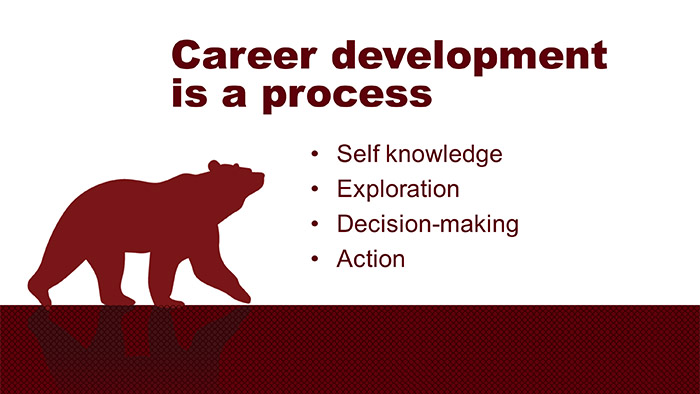Career development process
Understanding the process
Deciding on a major or a career direction can feel overwhelming. The more we understand the process, though, the more control we have in managing our careers. Career development is an ongoing process consisting of four main recurring steps: self knowledge, exploration, decision-making, and action.
Self knowledge
Self knowledge means to understand ourselves, and this begins by understanding four main elements: our personality, interests, skills, and values.
- Personality: Who am I?
- Interests: What do I like (and dislike)?
- Skills: What am I good at?
- Values: What’s important to me?
The goal is to be able to communicate these answers clearly and to understand how the four elements interrelate and connect to careers.
How can the Career Center assist you?
- Make an appointment to meet individually with a career counselor (career resources specialist). During these confidential appointments, the career counselor will discuss your career goals, questions, and concerns and identify career assessments and inventories that would benefit you.
- Take in-depth career assessments and inventories to help you gain self knowledge and clarify your career goals. A career counselor will interpret the results and discuss next steps with you.
- Enroll in the two-credit-hour class, IDS 120: Exploring Majors and Careers. This semester-long course, which is available either online or in a seated classroom, covers all the stages of the career development process.
Exploration
How many job titles exist? No one knows, because the number constantly changes. However, the U.S. Department of Labor has categorized 840 classifications of occupations. How can we explore so many possibilities?
- Use the self knowledge gained through career assessments to discover potential career options that would be a good fit for your personality, interests, skills, and values.
- Read What can I do with this major? to discover the connections between majors and career paths
- Talk to professionals working in occupations that interest you. Informational interviews are interviews in which the student asks the employer questions and receives advice for entering the career field. You also may be able to job shadow the professional. Job shadowing is a method for observing or "shadowing" professionals at work. Sometimes a job shadow experience lasts only an hour or two; sometimes you are able to shadow a professional for an entire day or longer.
- Get involved in campus organizations. Many organizations often sponsor career panels.
- Research occupations, industries, employers, and geographic regions.
How can the Career Center assist you?
- If you have completed career assessments with the Career Center, your career counselor can help you with this exploration process. In addition, if you have decided on a major, you may want to meet with the career resources specialist linked to your major.
- If you need help in locating professionals to interview or informally job shadow, a career resources specialist may be able to assist you.
Decision-making
The decision-making stage can be challenging for many people, because we may feel a career decision is an either-or situation: If we decide on one career, then we eliminate all the others we're considering. And that feels like a huge commitment, so huge that many people put off making the decision as long as possible. As many wise people have noted, "knowledge is power," and the more knowledge you have of occupations and the world of work, the more powerful your ability to make career decisions will be.
Use decision-making techniques to develop a career plan and to clarify your career goals.
- Identify the decision
- Gather information
- Identify alternatives
- Determine pros and cons
- Choose among alternatives
- Take action
- Review and evaluate decision
Keep a file or notebook on careers, so when you hear about an occupation that you want to explore, you can document it. This also will enable you to log helpful resources for your career explorations. This could include everything from websites to a list of names and contact information of people to add to your network.
How can the Career Center assist you?
- Make an appointment with a career resources specialist to help you locate resources for learning about careers.
- Learn about decision-making techniques from a career resources specialist.
Action
While collecting information and analyzing it are crucial steps, they have little value without action.
Take charge of your major and your career by setting S.M.A.R.T. goals to obtain your objectives:
- Specific – What is your specific goal? Be a precise as possible. Answer who, what, when, where, and why.
- Measurable – How do you measure success? How will you know when you have reached your goal? Your measurement needs to be precise and answer the question of “how many” or “how often.”
- Attainable – Make sure your goal is attainable and realistic. If it isn’t, it will always remain a dream. While setting high standards is important, if the standards are unrealistic, then they probably will not be achieved.
- Realistic – Does your goal align with your other goals and your values? If it conflicts with your vision of yourself or your short- or long-term plans, then you should reassess the goal.
- Time-based – Set a deadline for achieving your goal. If your goal includes steps or milestones, make a timeframe for them as well. Again, be precise. If your deadline is a vague “sometime in the future,” then your goal may always remain a dream.
How can the Career Center assist you?
- Make an appointment with a career resources specialist to learn more about setting S.M.A.R.T. goals.
